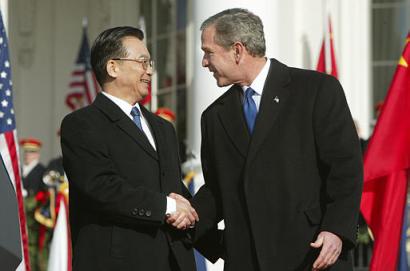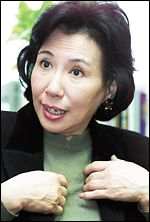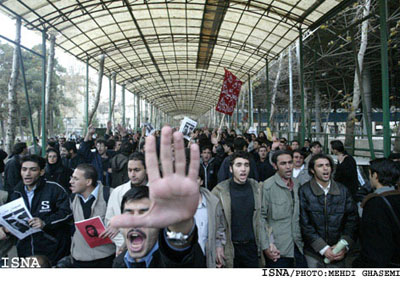
Their parents held street rallies chanting "Death to America." Now young Iranians congregate to declare their rejection of theocratic totalitarianism (via Instapundit):
Sporadic clashes rocked, today, several provincial cities, such as, Esfahan, Hamadan, Mashad, Ahwaz, Oroomiah (former Rezai-e) and Shiraz as students came out of the universities, despited the formal interdiction, and rallied to hundreds of supporters.Islamic regime's Special forces and vigilantes attacked the demonstrators who shouted slogans against the regime and its leaders while requesting Free Elections for Iran's Self Determination.
From someone who knows, a look into the Iranian revolutionary mind:
Posters and tracts that were distributed had many slogans in favor of US intereference in Iran. A poster read "Establish democracy with American boots," another one read "foreign oppression is preferable to domestic oppression" . The cover of a student magazine carried by everyone stated "Establishing democracy and freedom has the highest value even if its through occupation and foreign interference".A tract read: "Our main enemy is not the US, our main enemy is inside of our house".
Some students called out these slogans to the chagrin of other students who felt sad that the situation had become so desperate as a result of 25 years of dictatorship that some would prefer a foreign invasion. These slogans included: "[America] is Victorious the Dictators will be destroyed[.]"
I certainly wouldn't want to conclude that military action and the accompanying collateral damage were the only solution - both the danger of warfare and the hopeless prospect of liberating myself from an ensconced dictatorship without warfare would be difficult to accept. But as a Zimbabwean said earlier this year, "If only George Bush would come here and Saddam us."

This is disappointing but ultimately, unsurprising. The status quo sought by detente is still alive in the United States government. We will probably not see a ideologically reasoned policy towards Taiwan or Israel from the Baby Boomers. Bill Kristol (yes, much more reliable on foreign policy matters) is simple in his assessment: it's appeasement, and a mistake. I hope Taiwan will have none of it.
BUT...: Old dogs aren't totally hopeless on new world orders. (Via Andrew Sullivan.)
TAIWAN REDUX: Apparently, behind-the-scenes talks were not without a reiteration of America's defense of Taiwan in the event of Chinese aggression. Moreover, I just overheard the president's statement earlier today of the White House's disapproving look towards referendums on independence: it sounded pretty forced. The question is, then, when will administration policy match the president's heart?
There is talk of a stunning reversal of White House - and, indeed, American - policy towards Taiwan. Bill Kristol:
[A]ccording to numerous government sources, the senior director for Asian affairs at the National Security Council, James Moriarty, and Doug Paal, the de facto U.S. ambassador to Taiwan, are urging President Bush to declare, privately and perhaps publicly, that the United States opposes Taiwan's independence. This would be a significant change in America's so-called "One-China Policy," a change very much in Beijing's favor.
The print edition of the Wall Street Journal offered an editorial on the subject today, as well, echoing that "[Moriarty and Paal] want Mr. Bush to change U.S. policy on Taiwan independence from one of neutral 'non-support' to active and presumably public 'opposition.'"
Not suprisingly, both conservative publications warn that such a decision would not only risk escalating tensions between the two Pacific nations, but would stand as flatly contradictory to the president's overriding foreign policy of spreading democracy. Appeasing the world's most powerful totalitarian state does not exactly jive.
Here's where the situation gets interesting: the Journal, perhaps trying to be fair to the interests of Paal and Moriarty, did a bit of an overreach in describing Taiwan's confrontation with China. Here it is, draped across about five paragraphs:
The U.S. policy shift is also being advocated as a way to rein in the admittedly erratic behavior of Taiwan President Chen Shui-bian. ...Mr. Chen would love to replay the events of 2000, when he rallied victory after the mainland Chinese Premier wagged his finger and told Taiwanese not to vote for him....[Shui-bian's] goal seems to be to steer a course toward Taiwanese independence that goes just far enough to infuriate China into public threats, but not so far as to spark a war.
...So Mr. Chen has been raising the ante. ...He now also wants to invoke a provision for holding a "sovereignty" referendum. ...His excuse for the referendum...so Mr. Chen is flirting with disaster like never before.
...The job of reining in Mr. Chen can best be accomplished by the Taiwanese people...
Too often the passage of time so ossifies a debate that people are separated from their dearest principles. The Wall Street Journal seems to have fallen into the same trap it anticipates snaring Bush. Does the Journal actually believe that a nascent country's provocation - through referendum for declaration of democratic independence - of its vastly militarily superior, authoritarian motherland across the ocean is "combustible" behavior? What a shame the paper wasn't published two hundred years ago, when it could help "rein in" the "admittedly erratic" likes of Patrick Henry, John Adams, and Thomas Jefferson. I think the Journal's editors need to refresh their perspective - and realize what they wrote about the struggle for freedom today.
Strict Jeffersonian democracy in the Near East, led by a nobel laureate? Iranian freedom fighter Koorosh Afshar's short commentary on the subject from last month is reprinted in National Review.
The military survey team for a reconstruction-skittish Japan has returned with pleasing news:
[Prime Minister Koizumi's] defense chief's comments suggested the government may be satisfied with security conditions in a sector near the southern city of Samawah that Japan has been considering for a deployment that will reportedly involve more than 1,000 soldiers from the nation's Ground Self-Defense Force.''My impression was that the security conditions in southern Iraq are rather stable compared to other regions,'' Ishiba said.
The contents of the report have not been made public. But Japanese national media reported that Koizumi's Cabinet may give its approval as early as next week for an operation in which ground troops would arrive in Iraq early next year.
The beauty of democratization: in time, democratic nations are able to give the help they once received.
Bill Federer on this day:
In 1789, President George Washington proclaimed the first National Day of Thanksgiving. He wrote: "Whereas it is the duty of all nations to acknowledge the Providence of Almighty God, to obey His will... I do recommend... Thursday, the twenty-sixth day of November... to be devoted by the People of these United States to the service of that great and glorious Being, who is the beneficent Author of all the good that was, that is, or that will be." Washington continued: "that we may... humbly offer our prayers... to the great Lord and Ruler of Nations, and beseech Him to pardon our national... transgressions."
Peace through strength on earth, good will to men. And speed our fowl, cooked to perfection, onto the table.
This is the first in what I hope to be a continuing summary of Japanese politics, providing links, pictures and commentary from one foreign enthusiast to another. The category is entitled Doozo Yoroshiku, after the traditional political greeting yelled - usually through bullhorns - by political campaign aides for their smiling, white-gloved candidates. It's my hope that Japan's politics are as delightful as its cultural idiosyncracies, and that readers will find this informative as much as enjoyable. So, then, Doozo Yoroshiku, and read on.

(Is it me, or is the irony of Japan's military being named the SDF just too much? If you agree, write to a representative and tell the Diet to fund house-sized, flying, transforming robots.)
John Derbyshire of National Review is a clever man with a colorful past and a rare writer's wit. What he is not, however, is a reliable source for foreign policy pontification. I believe that commentary on the subject can be done with a little knowledge plus equal parts intuition and sociological sense - or else I wouldn't do it. Derbyshire, for whatever reason, seems to maintain a terrible record of predictions and observations; the biggest flop being his "impression" that Bush, after rolling over the Taliban in record time, would stiff on Baghdad. Derbyshire was good enough to carefully and intelligently retract when the other shoe was weeks away from dropping, but one wonders how he assembled such a miscalculation in the first place - other than being a Boomer whose life has been dominated by democracies seldom in any position to challenge the polity of dictatorships, which is no fault of his own. I'd become accustomed to certain political habits throughout most of my years, too. The Soviet, 800-pound gorilla is gone, however - Russia's ominous portent aside - and the free world has been given twelve years not only to remember which countries are self-governed and which are quietly stepping on their populations' collective faces, but to reassess its posture towards those stubborn despots.
Derbyshire certainly has an affinity for the Chinese, too. But why this odd observation:
I'll pass on Mexico, having left it too late in life to start learning Spanish. There is a city in China I have my eye on, though. A nice place, by the sea; quiet, clean, and civilized, big enough to offer some interesting dinner companions, yet not so big as to be full of foreigners on the make. Pleasant maritime climate, great fresh seafood.What's that? It's a Communist country? Oh, sure, the whole government system stinks. The place is awash with corruption, and if you tick off the wrong official, you could find yourself in court on an invented rap, looking at a ten-year jail term.
China is not totalitarian any more, though. You're not expected to memorize gibberish political formulas, not once you've got through with school anyway. You don't have to go to rallies and "political study" meetings any more. In the matter of everyday freedoms, it's probably close to the level of Mexico now. The thing about those places is, once you have mastered a few simple rules, the authorities pretty much leave you alone.
That's a mighty big caveat: don't manage your destiny with too much autonomy, and the Reds are hunky-dory. They won't even have you forced into mass rote or publicly humiliated for having the barber cut your coif like Mao. Beijing, on the up-and-up. On the face of it, Derbyshire ought to know better, however facetious he's being. Frankly, it's hard to tell. Derbyshire's not alone in the "co-opetitor" judgment of China.
Ironically, words like that could come at no better time for all of us to be reminded what threat to freedom China is determined to represent:
Raising the stakes in an already tense situation, China threatened in remarks published Wednesday that "the use of force may become unavoidable" if Taiwan pursues independence - the mainland's strongest statement in years against its archrival...."The people of Taiwan are standing at a very critical historical juncture, so let me give advice to all the people of Taiwan: Do not act just on impulse," [former Premier Zhu Rongji] said during a news conference [in 2000]. "Otherwise you will regret it very much and it will be too late to repent."
Last month, Beijing condemned Taiwan's leaders for their push for independence but stopped short of threatening war.
"The separatist activities by Taiwan independence elements directly endangers the basic interests of Taiwan compatriots, and it is a disaster for Taiwan," an unidentified spokesman from the Taiwan Affairs office was quoted as saying by Xinhua. "Activities like this cannot be tolerated by the sons and daughters of the Chinese nation."
China may try to look like us, but she isn't even close. There's a silver lining, however. Richard Armitage defended our democratic ally Taiwan:
"We have good competent forces there," Armitage said as he also offered assurances that the Bush administration would provide Taiwan with "sufficient defense articles for her self-defense."
Strongmen know only code of conduct: rule through strength, expansion through conquest (yes, Taiwan to China is pretty close as the Deutschsprechendevolk were to Nazi Germany). They can only be deterred through the threat of equal or greater force; dislodged by revolution or foreign deposition. And prevented from seizing power by robust representative government. We should not mistake losing sight of those facts of life with hope, especially when hope is reserved exactly for the ability to both resist dictatorship, remove it, and begin anew where it once was.
This isn't my sort of line, but considering North Korea's combination of deadly armaments and criminal insanity, it could be worse:
A top U.S. envoy and Japan's defense chief have agreed that "dialogue and pressure" are the best tactics for getting North Korea to give up its suspected nuclear weapons programs. The discussions have apparently provided a basis for more multilateral talks on resolving the crisis on the Korean peninsula.After the meeting, Defense Agency Director General Ishiba told reporters Japan and the United States agreed to continue "dialogue and pressure" to persuade Pyongyang to halt its pursuit of nuclear weapons. Mr. Ishiba says resolving the matter diplomatically and peacefully does not mean accepting everything North Korea demands. He adds it would be unacceptable for Pyongyang to benefit from making threats and trying to possess nuclear bombs and other weapons of mass destruction.
Like I said, it could be worse. The United States could be continuing work on the very light-water power plants North Korea would use for weaponry. Judging from Pyongyang's tantrums that began when construction was halted, Mr. Ishiba's "pressure" works quite well.
Colin Powell and his Undersecretary of State, Richard Armitage, are apparently - and thankfully - not reading from the same script. Powell had words for Iran's theocrat mullahs that were abnormally, er, honest for Foggy Bottom:
The Iranian people want their freedom back, of this there can be no doubt...They do not want to banish Islam from their lives, far from it...They want to be free from those who have dragged the sacred garments of Islam into the political gutter...They have been imprisoned for wanting this, they have been gagged for wanting this, they have been intimidated and threatened for wanting this, some have already died for wanting this.
Asked about the politically stunning awarding of the Nobel peace prize to activist Shirin Ebadi:
The hidebound clerics of Iran know what it means, too...Should they be worried? Does morning follow night? They should be.
Hidebound indeed. Could someone encourage Mr. Armitage to straighten out his own statements about our Iran policy? Good cop/bad cop would be a good explanation of this dichotemy if we weren't talking about the State Department. Let's hope Powell's statements are neither isolated or due for retraction.

